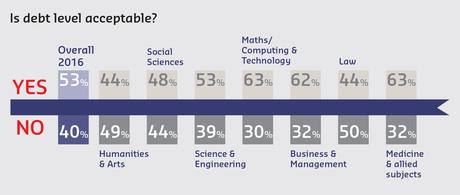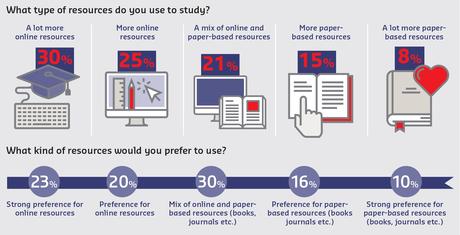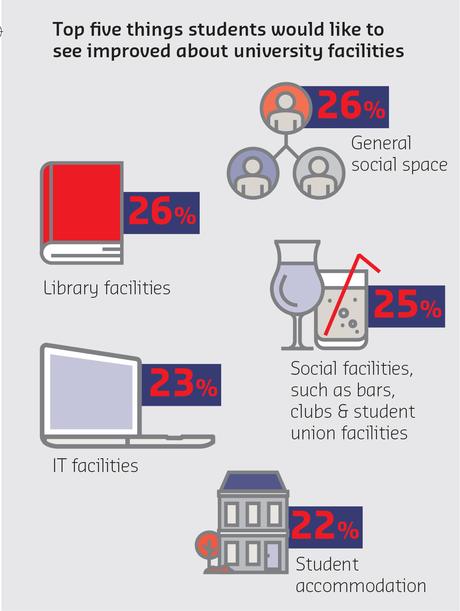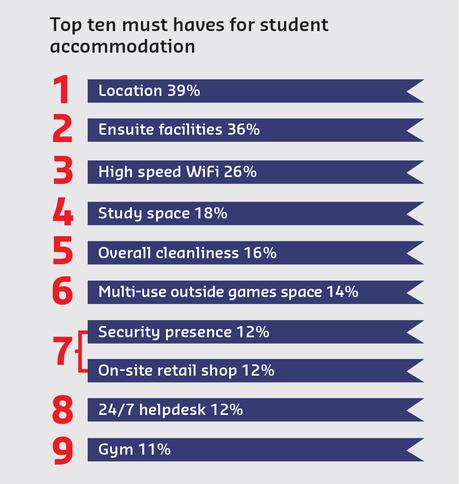
Sodexo, the world's largest services company, today announced the findings of its seventh University Lifestyle Survey, the first completed with all respondents paying £9,000 in annual tuition fees.
Although the majority of students are broadly happy with university life, the increasingly competitive graduate market, rising costs of living and growing debt levels are leading millennial students to take university very seriously, according to Sodexo's seventh University Lifestyle Survey, published in association with Times Higher Education magazine.
Unsurprisingly, the expectation of debt for UK students has risen since the introduction of £9,000 fees in 2012, with two-thirds (66%) expecting to leave university with debts of £20,000 or more, double the number (30%) who said this four years ago. Many believe they will rack up far higher debts, with 29 per cent anticipating their debt at graduation to be more than £40,000, up from just 2 per cent of those surveyed before the new fees took effect.

Worryingly, 40 per cent said they did not believe their expected debt was acceptable in terms of their future career prospects, up from 28 per cent in 2014 and 18 per cent in 2012.
Day-to-day finances were also cited as a source of stress by almost half of all students (48%), up six percentage points on 2014. These immediate money troubles were mentioned more often than long-term debt after graduation, which was cited by 38 per cent of students as a major source of stress, up from 25 per cent two years earlier.
Students are feeling the pinch of rising accommodation costs, with 30 per cent paying more than £400 a month, up from 25 per cent in 2012 and 20 per cent in 2010. Ten years ago, just 10 per cent paid more than £400 a month in rent. This may be one factor leading to an increasing number of students choosing to live at home - 21 per cent this year, up from 13 per cent in 2008 and 19 per cent in 2014.

These financial anxieties may worsen in coming years as maintenance grants are removed this autumn - a policy which could have major implications for how young people approach university. Asked how they would have approached the choice about going to university, knowing maintenance grants weren't available, a quarter of female students who currently receive the grants said they would have postponed their studies, whilst one in five males (22%) would not have chosen to go to university at all. To deal with this financial shortfall next year a third of students said they would need to take on more loans, while 31 per cent would work more, and 29 per cent would spend less on food and drink.
Zain Rizvi, third year student at Cass Business School, City University said; "The high cost of university definitely didn't deter me, but I'm conscious that my loans will have to be paid back eventually. I think students are determined to make the most of their time at university. I see it as a time to not only get a degree, but also to get work experience, make connections with potential employers and build a strong network of friends and contacts."

In light of the greater financial burden on students, the survey reveals some surprising lifestyle trends that dispel the stereotype of students as hard-drinking party animals. More than a third (36%) of students report they don't drink alcohol, up from 26 per cent in 2012 and 28 per cent say they don't spend anything on socialising. Instead, there is a strong café culture at universities - over half of students (53%) spend up to £20 a week on tea and coffee from university cafés.
The survey also uncovers some interesting findings about study habits. The vast majority of students now use more online study resources than offline - 55 per cent favoured online resources against 23 per cent who preferred traditional books, papers and journals. The area in which students most wanted to see investment on campus was the library, with 26 per cent wanting to see investment there, up from 19 per cent who cited this in 2014.
Professor Jane Longmore, Deputy Vice-Chancellor at Southampton Solent University, co-author and validator of the survey, noted: "This research shows that while university life hasn't changed fundamentally, millennial students are living more interconnected lives, moving seamlessly between online and offline, and their academic and social lives.
The survey suggests that increasingly the library is the major social learning space in the institution; student sociability has moved into the academic heart of the university and students are making greater use of other social learning spaces, including campus coffee bars.
It is good to hear that the overwhelming majority of students are happy with their experiences, but important that universities continue to modernise their estates in order to anticipate and meet the needs of future generations."

Finally, the growth in private student accommodation and the rise in rents means students are now becoming more demanding about their digs. Having an en-suite bathroom - once an unimaginable luxury for undergraduates - is now a 'must have' for many students. When asked to select the five most important requirements for accommodation, 36 per cent of students in university halls listed the existence of their own bathroom as their number one priority, ahead of high-speed WiFi (26%) and having a place to study (18%).
Paul Anstey, Sodexo's CEO of Universities, UK & Ireland, Nordics and Benelux Regions, commented: "With increased financial pressure on students, it is vital that universities and service providers like Sodexo work together on creative solutions to improve students' quality of life and to offer a university experience that students truly value."

